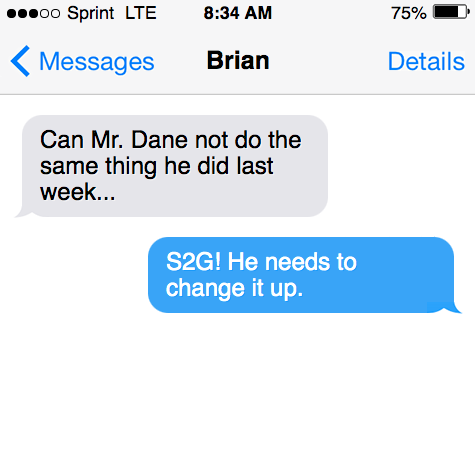What does “S2G” mean over text? If someone sent “S2G” in a text message, it could be confusing to understand what it means. Does it mean sing to God? Does it mean something inappropriate? Language has taken another form thanks to the internet and text messaging. It’s commonplace for teenagers to use short form acronyms to save time and keystrokes when having conversations.
Learn what the abbreviation means in this short guide…
“S2G” meaning and definition
“S2G” simply means, “Swear to God.” It is an internet slang term for when someone wants to swear to God. Or rather, when they intent to emphasize a point of view, perspective, or opinion that they could have about a subject.
Frequently, “S2G” is used on the web, online chat, or texting.

Common connotations
Typically, the acronym will get used in conversations where one person wants to agree to the truth of statement on behalf of themselves or another person. It is used to provide emphasis and intention. And in the correct context, could allude to aggravation.
Emotions intended:
- Emphasis
- Aggravation
- Agreement
Formality
The formality for “S2G” is typically informal. And not to get used in business settings.
Correct use: Texting between friends.
Incorrect use: A business email to your manager.
Synonyms
Typically, a person who is using “S2G” intends to declare truth to the given statement. It could mean one or many of the following synonyms:
- To be truthful
- To vow
- Taking an oath
- Pledging
- Declaring
- Attesting
- Promising
- Swearing on a life
History of “S2G”
Urban Dictionary dates the use of the acronym back to 2006. Making it one of the older acronyms used on the internet. No other meanings of the acronym have been found on the internet thus far.
Examples of “S2G” getting used in a text message
Here are example conversations where “S2G” could most commonly get used:
Example one
Friend 1: “I wish Mr. Smith would come up with more interesting stuff to share during science class.”
Friend 2: “S2G! If he doesn’t come up with something new, I might leave.”
In this example, the second friend is using the internet slang acronym “S2G” to draw emphasis to the first point that their friend is making. When using the acronym in this fashion, they are agreeing to the opinion of the other friend more intensely.
Example two
Friend 1: “S2G, we need to go.”
Friend 2: “I know, I’m sorry, it will take a moment. Can you wait?”
The second example shows the first friend using the “S2G” acronym to allude to their aggravation. The friend would be saying, “I swear to God, we need to go.” With the intention of providing emphasis to their impatience.
Similar short forms and abbreviations
Other similar short forms:
ISTG: Or, “I Swear to God,” is another acronym that closely resembles “S2G” both in meaning, intention, and how it gets used on the internet.
IMO: Meaning, “In My Opinion,” which can get used to emphasize someone’s point in both agreement and disagreement. Typically used in a conversation where there is some level of debate or perspective shared between two friends.
Sources
- Swear to God – Thesaurus
- Swear to God – Word Hippo
- Urban Dictionary – S2G
- S2G Meaning and Definition – Internet Slang
Inside this article
Fact checked:
Content is rigorously reviewed by a team of qualified and experienced fact checkers. Fact checkers review articles for factual accuracy, relevance, and timeliness. Learn more.
Core lessons
Glossary
- Abstract Noun
- Accusative Case
- Anecdote
- Antonym
- Active Sentence
- Adverb
- Adjective
- Allegory
- Alliteration
- Adjective Clause
- Adjective Phrase
- Ampersand
- Anastrophe
- Adverbial Clause
- Appositive Phrase
- Clause
- Compound Adjective
- Complex Sentence
- Compound Words
- Compound Predicate
- Common Noun
- Comparative Adjective
- Comparative and Superlative
- Compound Noun
- Compound Subject
- Compound Sentence
- Copular Verb
- Collective Noun
- Colloquialism
- Conciseness
- Consonance
- Conditional
- Concrete Noun
- Conjunction
- Conjugation
- Conditional Sentence
- Comma Splice
- Correlative Conjunction
- Coordinating Conjunction
- Coordinate Adjective
- Cumulative Adjective
- Dative Case
- Determiner
- Declarative Sentence
- Declarative Statement
- Direct Object Pronoun
- Direct Object
- Diction
- Diphthong
- Dangling Modifier
- Demonstrative Pronoun
- Demonstrative Adjective
- Direct Characterization
- Definite Article
- Doublespeak
- False Dilemma Fallacy
- Future Perfect Progressive
- Future Simple
- Future Perfect Continuous
- Future Perfect
- First Conditional
- Irregular Adjective
- Irregular Verb
- Imperative Sentence
- Indefinite Article
- Intransitive Verb
- Introductory Phrase
- Indefinite Pronoun
- Indirect Characterization
- Interrogative Sentence
- Intensive Pronoun
- Inanimate Object
- Indefinite Tense
- Infinitive Phrase
- Interjection
- Intensifier
- Infinitive
- Indicative Mood
- Participle
- Parallelism
- Prepositional Phrase
- Past Simple Tense
- Past Continuous Tense
- Past Perfect Tense
- Past Progressive Tense
- Present Simple Tense
- Present Perfect Tense
- Personal Pronoun
- Personification
- Persuasive Writing
- Parallel Structure
- Phrasal Verb
- Predicate Adjective
- Predicate Nominative
- Phonetic Language
- Plural Noun
- Punctuation
- Punctuation Marks
- Preposition
- Preposition of Place
- Parts of Speech
- Possessive Adjective
- Possessive Determiner
- Possessive Case
- Possessive Noun
- Proper Adjective
- Proper Noun
- Present Participle
- Prefix
- Predicate



